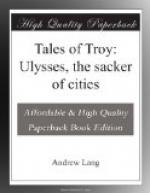Next day half the army, with axes in their hands, were sent to cut down trees on Mount Ida, and thousands of planks were cut from the trees by Epeius and his workmen, and in three days he had finished the horse. Ulysses then asked the best of the Greeks to come forward and go inside the machine; while one, whom the Greeks did not know by sight, should volunteer to stay behind in the camp and deceive the Trojans. Then a young man called Sinon stood up and said that he would risk himself and take the chance that the Trojans might disbelieve him, and burn him alive. Certainly, none of the Greeks did anything more courageous, yet Sinon had not been considered brave.
Had he fought in the front ranks, the Trojans would have known him; but there were many brave fighters who would not have dared to do what Sinon undertook.
Then old Nestor was the first that volunteered to go into the horse; but Neoptolemus said that, brave as he was, he was too old, and that he must depart with the army to Tenedos. Neoptolemus himself would go into the horse, for he would rather die than turn his back on Troy. So Neoptolemus armed himself and climbed into the horse, as did Menelaus, Ulysses, Diomede, Thrasymedes (Nestor’s son), Idomeneus, Philoctetes, Meriones, and all the best men except Agamemnon, while Epeius himself entered last of all. Agamemnon was not allowed by the other Greeks to share their adventure, as he was to command the army when they returned from Tenedos. They meanwhile launched their ships and sailed away.
But first Menelaus had led Ulysses apart, and told him that if they took Troy (and now they must either take it or die at the hands of the Trojans), he would owe to Ulysses the glory. When they came back to Greece, he wished to give Ulysses one of his own cities, that they might always be near each other. Ulysses smiled and shook his head; he could not leave Ithaca, his own rough island kingdom. “But if we both live through the night that is coming,” he said, “I may ask you for one gift, and giving it will make you none the poorer.” Then Menelaus swore by the splendour of Zeus that Ulysses could ask him for no gift that he would not gladly give; so they embraced, and both armed themselves and went up into the horse. With them were all the chiefs except Nestor, whom they would not allow to come, and Agamemnon, who, as chief general, had to command the army. They swathed themselves and their arms in soft silks, that they might not ring and clash, when the Trojans, if they were so foolish, dragged the horse up into their town, and there they sat in the dark waiting. Meanwhile, the army burned their huts and launched their ships, and with oars and sails made their way to the back of the isle of Tenedos.




